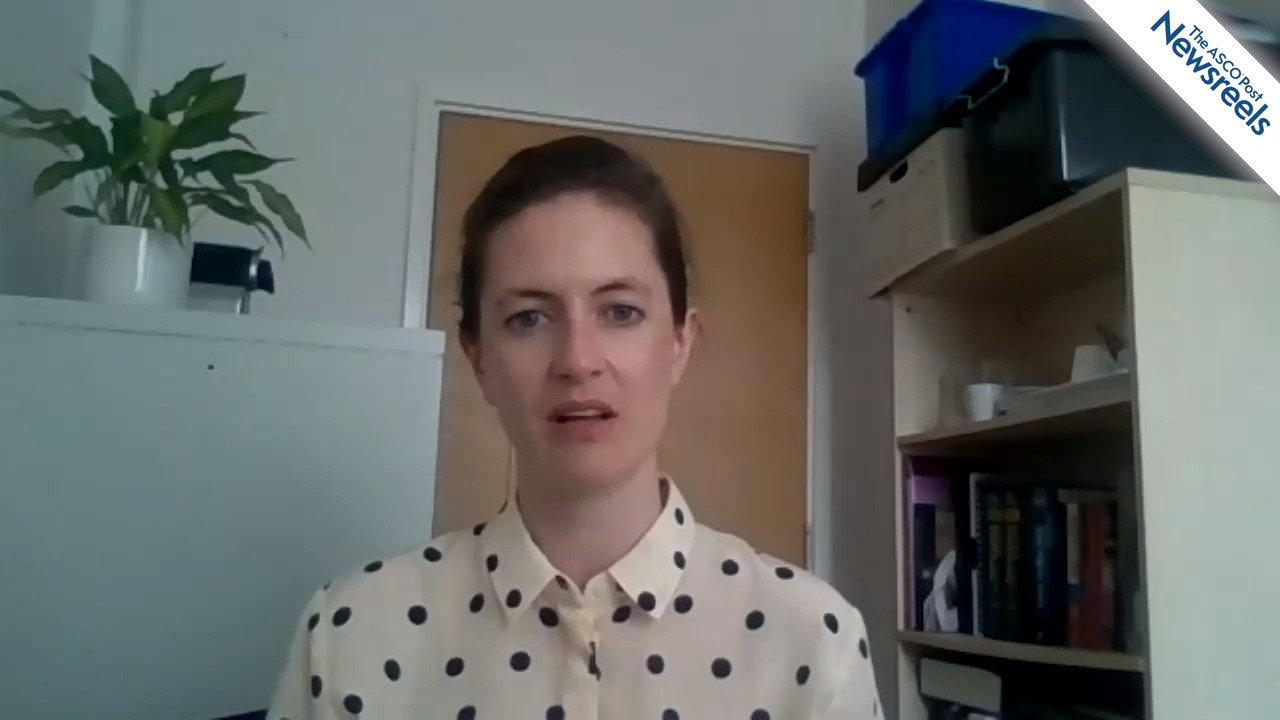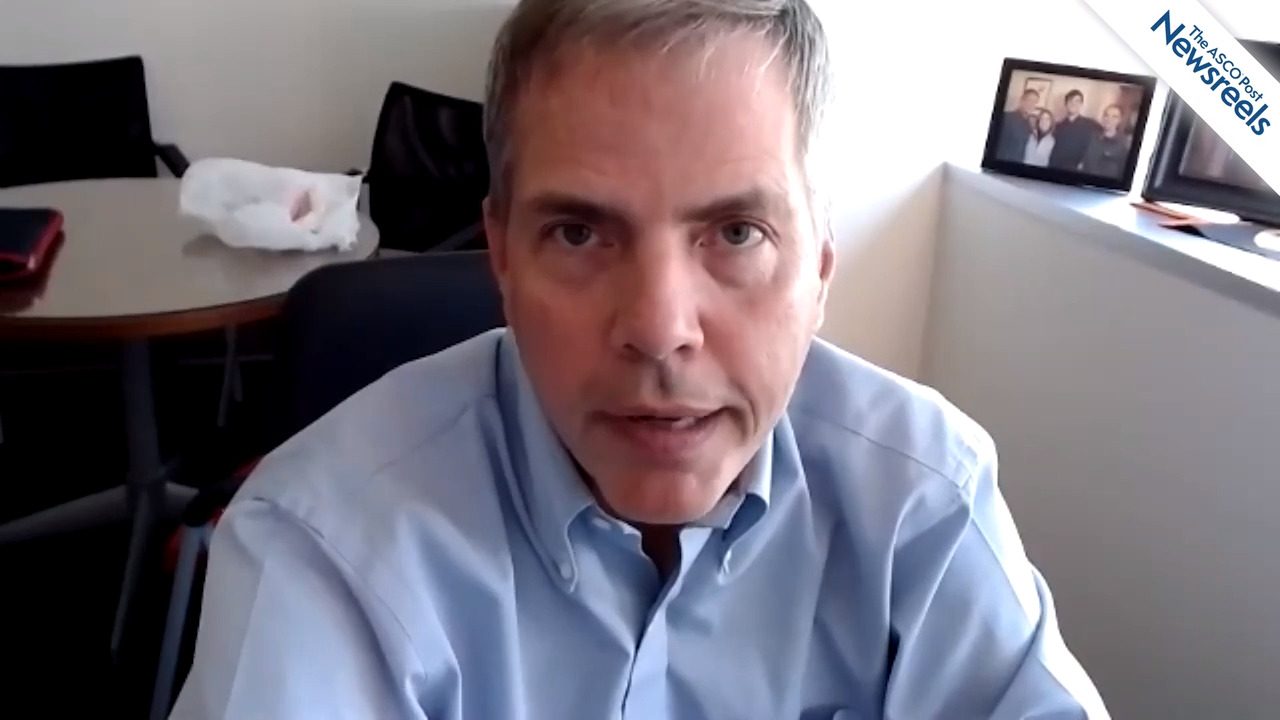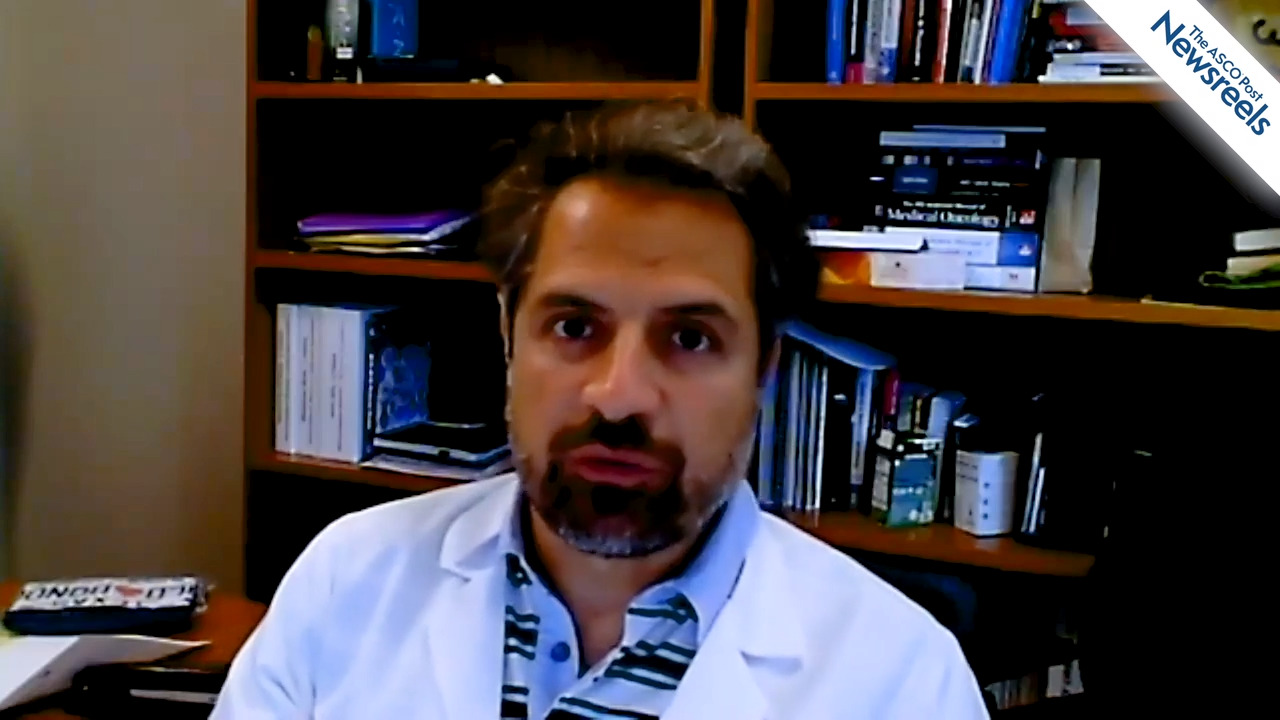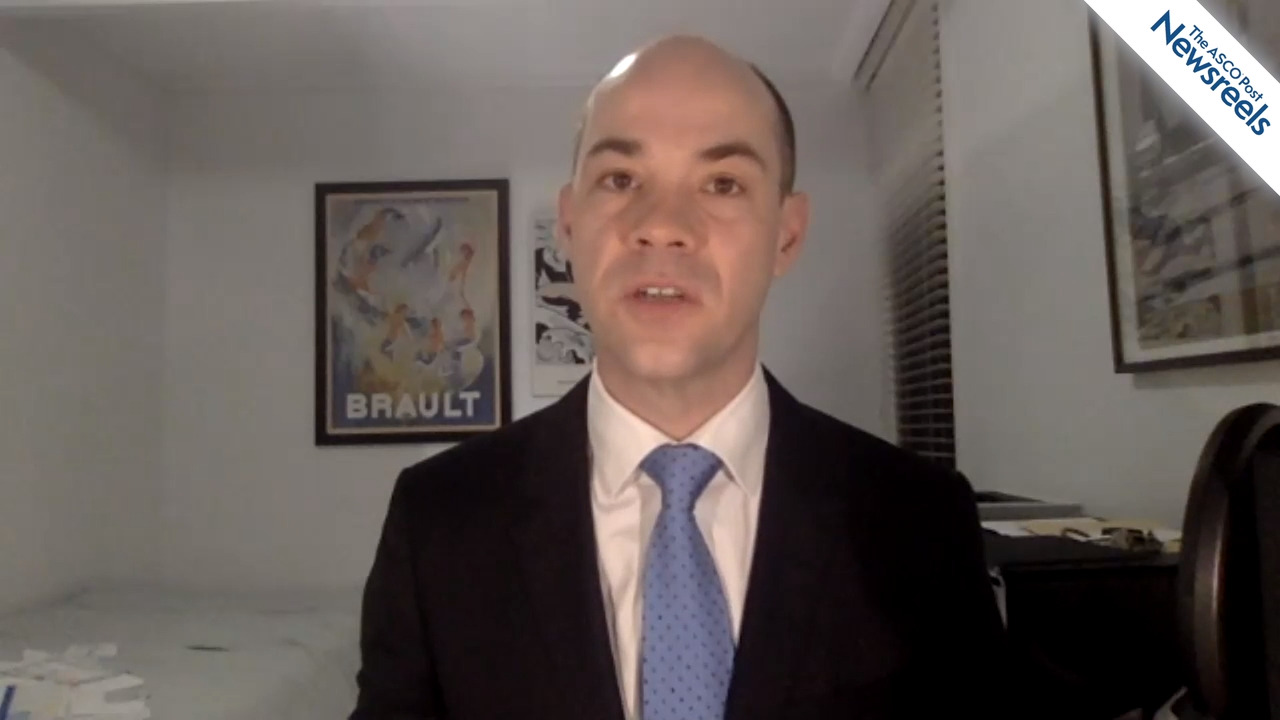FDA Extends the Approval of Pembrolizumab for Patients With Classical Hodgkin Lymphoma
On October 14, the U.S. Food and Drug Administration (FDA) extended the approval of pembrolizumab (Keytruda) for the following indications: Adult patients with relapsed or refractory classical Hodgkin lymphoma Pediatric patients with refractory classical Hodgkin lymphoma or classical Hodgkin...
Identifying Characteristics of Infused CAR T Cells Associated With Efficacy and Toxicity in Patients With Large B-Cell Lymphoma
Researchers have identified molecular and cellular characteristics of anti-CD19 chimeric antigen receptor (CAR) T-cell infusion products associated with how patients with large B-cell lymphoma respond to treatment and develop side effects. The research team also found that early changes in...
FDA Pipeline: Priority Review for Agents in Multiple Myeloma, Anaplastic Large Cell Lymphoma
Recently, the U.S. Food and Drug Administration (FDA) granted Priority Review to therapies for pretreated patients with multiple myeloma and pediatric patients with ALK-positive anaplastic large cell lymphoma; granted Fast Track designation to novel agents in gastric/gastroesophageal junction...
Consolidation Radiotherapy for Patients With Advanced Hodgkin Lymphoma and a Large Nodal Mass
As reported in the Journal of Clinical Oncology by Gallamini et al, the final analysis of the phase III GITIL/FIL HD0607 trial has shown that consolidation radiotherapy did not improve progression-free survival vs no further treatment in patients with advanced Hodgkin lymphoma and a baseline large...
Nonlymphoma Mortality Following Initial Chemotherapy in Patients With Classical Hodgkin Lymphoma
In a study reported in the Journal of Clinical Oncology, Dores et al found that patients with classical Hodgkin lymphoma continue to be at elevated risk for mortality from causes other than lymphoma, despite advances in treating this disease. As stated by the investigators, “Mortality for patients...
NCCN Adds Tafasitamab-cxix to Its Clinical Practice Guidelines in Oncology for B-Cell Lymphomas
MorphoSys and Incyte have announced that tafasitamab-cxix, a humanized Fc-modified cytolytic CD19-targeting monoclonal antibody, has been included in the latest National Comprehensive Cancer Network Clinical Practice Guidelines® (NCCN Guidelines®) in Oncology for B-Cell Lymphomas. Specifically,...
Good Outcomes With PET-Directed Therapy for Limited-Stage Diffuse Large B-Cell Lymphoma
As reported in the Journal of Clinical Oncology by Daniel O. Persky, MD, of the University of Arizona Cancer Center, Tucson, and colleagues, the phase II Intergroup National Clinical Trials Network Study S1001 has shown good outcomes with positron-emission tomography (PET)-directed therapy in...
Brexucabtagene Autoleucel for Relapsed or Refractory Mantle Cell Lymphoma
On July 24, 2020, brexucabtagene autoleucel, a CD19-directed genetically modified autologous T-cell immunotherapy, was granted accelerated approval for the treatment of adult patients with relapsed or refractory mantle cell lymphoma.1,2 Brexucabtagene autoleucel is approved with a Risk Evaluation...
Applications of Circulating Tumor DNA Liquid Biopsy Continue to Expand in Lymphomas
Liquid biopsies using circulating tumor DNA (ctDNA) have the potential to personalize medicine for patients with lymphoma, going beyond traditional markers and risk factors to provide dynamic assessments over time. Expanded applications of ctDNA liquid biopsy beyond diagnosis include early response ...
Disparities and Incidence of Late Effects of Treatment for AYA Lymphoma Survivors
The late effects of adolescent and young adults (AYA) with lymphomas are considerable and have not been given much attention, according to Theresa Keegan, MD, of the University of California at Davis. “Lymphoma is one of the most commonly occurring malignancies in AYAs,” she stated. “The 5-year...
Newer Therapeutic Approaches Improving Outcomes in Hodgkin Lymphoma
At the 2020 Debates and Didactics in Hematology and Oncology Virtual Conference, sponsored by Emory University School of Medicine and Winship Cancer Institute, Pamela Allen, MD, Assistant Professor of Medicine at Emory, described recent trials on therapeutic approaches that are informative on this...
Lisocabtagene Maraleucel for Relapsed or Refractory Large B-Cell Lymphomas
In the TRANSCEND NHL 001 study reported in The Lancet, Jeremy S. Abramson, MD, and colleagues found that the autologous CD19-directed chimeric antigen receptor (CAR) T-cell agent lisocabtagene maraleucel (liso-cel) produced a high response rate in patients with relapsed or refractory large B-cell...
Lymphomas in Adolescents and Young Adults Deserve Further Study
Adolescents and young adults (AYAs) with lymphoma are a unique population, with distinct biology, disparities in outcome, poorer survival compared with children and adults, and variable impacts of treatments. Ongoing research on this patient population with lymphoma will hopefully lead to improved...
Fine-Tuning CAR T-Cell Therapy for Lymphomas
Chimeric antigen receptor (CAR) T-cell therapies are a major advance in the treatment of hematologic malignancies and are making inroads in solid tumors, but there is room for improvement in their design, since not all patients respond, and those who do may relapse. Researchers are studying...
FDA Pipeline: Priority Reviews in Multiple Myeloma, Metastatic Breast Cancer, and NSCLC
Recently, the U.S. Food and Drug Administration (FDA) granted Priority Review to agents for the treatment of refractory multiple myeloma, metastatic breast cancer, and metastatic non–small cell lung cancer (NSCLC); gave Fast Track designation to treatments for NTRK mutation–positive solid tumors...
Final ASCEND Results Confirm Acalabrutinib as a Standard for Relapsed CLL
The Bruton’s tyrosine kinase (BTK) inhibitors have been one of the most exciting advances in the tre atment of chronic lymphocytic leukemia (CLL) and have led to the development of chemotherapy-free treatments for both treatment-naive as well as relapsed or refractory CLL based on studies where...
Acalabrutinib Improves Progression-Free Survival vs Idelalisib Plus Rituximab or Bendamustine Plus Rituximab in Relapsed or Refractory CLL
As reported in the Journal of Clinical Oncology by Paolo Ghia, MD, PhD, of the Università Vita-Salute San Raffaele, Milan, Italy, and colleagues, the phase III ASCEND trial showed significantly prolonged progression-free survival with acalabrutinib monotherapy vs the investigator’s choice of...
Tafasitamab-cxix in the Treatment of Diffuse Large B-Cell Lymphoma
In the Clinic provides overviews of novel oncology agents, addressing indications, mechanisms of action, administration recommendations, safety profiles, and other essential information needed for the appropriate clinical use of these drugs. On July 31, 2020, tafasitamab-cxix, a CD19-directed...
Chemotherapy-Free Approaches in Follicular and Mantle Cell Lymphomas
As chemotherapy and chemoimmunotherapy regimens reach their maximal impact in follicular lymphoma and mantle cell lymphoma, clinicians are turning to chemotherapy-free approaches to achieve better control, less toxicity, and (hopefully) a cure. During the ASCO20 Virtual Education Program, Sonali M. ...
FDA Pipeline: Priority Reviews for Immunotherapy Dose Regimen, Small Cell Lung Cancer; Fast Track Designations in Brain Cancer and Leukemia
Recently, the U.S. Food and Drug Administration (FDA) granted Priority Reviews for a novel dosing regimen for durvalumab as well as for trilaciclib in small cell lung cancer; granted Fast Track designations to treatments for glioblastoma and B-cell acute lymphoblastic leukemia; and issued reports...
Risk-Stratified Stem Cell Transplant and Vinblastine Monotherapy for Relapsed Pediatric Anaplastic Large Cell Lymphoma
As reported in the Journal of Clinical Oncology by Knörr et al, a trial of risk-stratified treatment for relapsed pediatric anaplastic large cell lymphoma (ALCL) showed that allogeneic stem cell transplantation (SCT) was effective in patients with high-risk relapse, whereas autologous SCT was not...
Early Rituximab Intensification in R-CHOP for Diffuse Large B-Cell Lymphoma
As reported in the Journal of Clinical Oncology by Pieternella Johanna Lugtenburg, MD, PhD, and colleagues, the phase III Haemato-Oncology Foundation for Adults in the Netherlands (HOVEN)/ Nordic Lymphoma Group HOVON-84 trial showed that early rituximab intensification in R-CHOP-14 (rituximab plus...
FDA Pipeline: Approval for First Liquid Biopsy Next-Generation Sequencing Companion Diagnostic; Designations in Ovarian Cancer, Leukemia, and Lymphoma
Recently, the U.S. Food and Drug Administration (FDA) approved the first liquid biopsy companion diagnostic that also uses next-generation sequencing technology to identify patients with non–small cell lung cancer (NSCLC) and specific types of EGFR mutations. The FDA also granted Fast Track...
Selinexor in Relapsed or Refractory Diffuse Large B-Cell Lymphoma
On June 22, 2020, the oral nuclear export inhibitor selinexor was granted accelerated approval for treatment of adults with relapsed or refractory diffuse large B-cell lymphoma (DLBCL), not otherwise specified, including DLBCL arising from follicular lymphoma, after at least two lines of systemic...
Highlights of Research in Lymphomas Presented During the EHA25 Virtual Congress
To complement The ASCO Post’s continued coverage of the virtual edition of the 25th European Hematology Association Annual Congress (EHA25 Virtual), here are a few abstracts selected from the meeting proceedings focusing on clinical research in Hodgkin and marginal zone lymphomas. Omission of...
Tazemetostat for Adults With Relapsed or Refractory Follicular Lymphoma
On June 18, 2020, the EZH2 inhibitor tazemetostat was granted accelerated approval for the treatment of adults with relapsed or refractory follicular lymphoma (FL) whose tumors are positive for an EZH2 mutation, as detected by a U.S. Food and Drug Administration (FDA)-approved test, and who have...
Can Radiotherapy Be Omitted for Some Patients With PET-Negative, Early-Stage Unfavorable Hodgkin Lymphoma?
The overwhelming majority of patients with early-stage unfavorable Hodgkin lymphoma may no longer require radiotherapy to treat their disease, according to data presented during the virtual edition of the 25th European Hematology Association (EHA) Annual Congress.1 The findings of the randomized,...
FDA Pipeline: Designations in Kidney and Lung Cancers, Myelodysplastic Syndromes, and More
Over the past few weeks, the U.S. Food and Drug Administration (FDA) has issued designations and accepted applications for novel agents, as well as approved companion diagnostics. We summarize these regulatory movements below. Breakthrough Therapy Designation for MK-6482 in von Hippel-Lindau...
Anti-CD30 CAR T-Cell Therapy for Patients With Relapsed or Refractory Hodgkin Lymphoma
In a pooled analysis of two parallel single-center phase I/II studies reported in the Journal of Clinical Oncology, Ramos et al found that anti-CD30 chimeric antigen receptor (CAR) T-cell therapy produced responses in a high proportion of patients with relapsed or refractory Hodgkin lymphoma. As...
FDA Approves Tafasitamab-cxix Combined With Lenalidomide to Treat Adults With Relapsed/Refractory DLBCL
On July 31, the U.S. Food and Drug Administration (FDA) approved tafasitamab-cxix (Monjuvi) in combination with lenalidomide for the treatment of adult patients with relapsed or refractory diffuse large B-cell lymphoma (DLBCL)–not otherwise specified, including DLBCL arising from low-grade...
Outcomes With PET-Directed Therapy for Limited-Stage DLBCL
As reported in the Journal of Clinical Oncology by Daniel O. Persky, MD, and colleagues, the phase II Intergroup National Clinical Trials Network Study S1001 has shown good outcomes with positron-emission tomography (PET)-directed therapy in patients with limited-stage diffuse large B-cell lymphoma ...
FDA Approves Brexucabtagene Autoleucel for Relapsed or Refractory Mantle Cell Lymphoma
On July 24, the U.S. Food and Drug Administration (FDA) granted accelerated approval to brexucabtagene autoleucel (Tecartus), a CD19-directed genetically modified autologous T-cell immunotherapy, for the treatment of adult patients with relapsed or refractory mantle cell lymphoma. “Tremendous...
Role of Rituximab in the Treatment of Children and Adolescents With Mature B-Cell Non-Hodgkin Lymphoma
Minard-Colin et al recently reported for the European Intergroup for Childhood Non-Hodgkin Lymphoma/Children’s Oncology Group (EICNHL/COG) a significant improvement in event-free survival among children and adolescents (aged 6 months to 18 years) with high-risk mature B-cell non-Hodgkin lymphoma...
Addition of Rituximab to Standard Chemotherapy Improves Event-Free and Overall Survival in Children With High-Risk, Mature B-Cell Non-Hodgkin Lymphoma
In a European Intergroup for Childhood Non-Hodgkin Lymphoma/Children’s Oncology Group phase III trial reported in The New England Journal of Medicine, Véronique Minard‑Colin, MD, PhD, of Gustave Roussy, Université Paris-Saclay, Villejuif, France, and colleagues found that the addition of rituximab...
The WHO Classification of Tumors of Hematopoietic and Lymphoid Tissues
The ASCO Post is pleased to present Hematology Expert Review, an ongoing feature that occasionally quizzes readers on issues in hematology. In this installment, Drs. Abutalib and Medeiros highlight the rare primary diffuse large B-cell lymphoma (DLBCL) of the central nervous system (CNS). For each ...
Monumental Progress in the Treatment of Diffuse Large B-Cell Lymphoma
Some monuments are difficult to topple. At least that was the case dating back to 1976, when investigators from the Southwest Oncology Group demonstrated the importance of doxorubicin in the treatment of patients with a group of lymphoid malignancies then referred to as diffuse aggressive...
Outcomes With Axicabtagene Ciloleucel in the Nontrial Setting in Patients With B-Cell Non-Hodgkin Lymphoma
In a study reported in the Journal of Clinical Oncology, Caron A. Jacobson, MD, and colleagues found that commercial use of the chimeric antigen receptor T-cell therapy axicabtagene ciloleucel in patients with relapsed or refractory B-cell non-Hodgkin lymphoma was associated with an overall...
FDA Pipeline: Novel Treatments for Hematologic Malignancies
Recently, the U.S. Food and Drug Administration (FDA) granted Priority Review to pembrolizumab for the second-line treatment of patients with relapsed or refractory Hodgkin lymphoma, and also accepted a supplemental new drug application for selinexor for pretreated patients with multiple myeloma....
Longitudinal Analysis of Health-Related Quality of Life in Patients With Hodgkin Lymphoma
A longitudinal analysis of health-related quality of life in patients from German Hodgkin Study Group trials, reported in the Journal of Clinical Oncology by Kreissl et al, showed a “high and persistent” amount of health-related quality-of-life deficits in survivors of Hodgkin lymphoma. The...
Effectiveness of Routine Blood Testing in Detection of Disease During Active Surveillance for Indolent Non-Hodgkin Lymphoma
In an Australian study reported in JCO Oncology Practice, Piercey et al found that routine blood tests have little utility in detecting relapse or progression of disease during active surveillance of patients with indolent non-Hodgkin lymphoma. As stated by the investigators, “Patients with...
Mark J. Ratain, MD, on Chronic Lymphocytic Leukemia: Making a Case for Low-Dose Ibrutinib
Mark J. Ratain, MD, of the University of Chicago, talks about why ibrutinib—which can lead to cardiotoxicities—should be studied at a lower dose for patients with chronic lymphocytic leukemia. Data suggest a reduced dose may prevent dose interruption due to adverse events and may have a better therapeutic index.
Elizabeth H. Phillips, MD, on DLBCL: Inotuzumab Ozogamicin Plus Chemotherapy in Front-Line Setting
Elizabeth H. Phillips, MD, of the University of Manchester and The Christie Hospital, discusses phase II findings showing inotuzumab ozogamicin plus rituximab, cyclophosphamide, vincristine, and prednisolone is a feasible and effective regimen for front-line treatment of high-risk patients with diffuse large B-cell lymphoma who are not eligible for standard chemotherapy (Abstract S232).
John C. Byrd, MD, on CLL/SLL: Acalabrutinib in Treatment-Naive Patients
John C. Byrd, MD, of The Ohio State University Comprehensive Cancer Center, discusses the mature results of a phase II study showing durable remissions and long-term tolerability of acalabrutinib in treatment-naive patients with relapsed or refractory chronic lymphocytic leukemia or small lymphocytic lymphoma (Abstract S163).
Survival With Different Reduced-Intensity Conditioning Regimens for Allogeneic Stem Cell Transplant in Patients With Non-Hodgkin Lymphoma
In a study reported in JAMA Oncology, Ghosh et al found that a more intense reduced-intensity conditioning and nonmyeloablative conditioning (RIC-NMAC) regimen consisting of fludarabine plus melphalan at 140 mg/kg (Flu-Mel14) appears to be associated with poorer overall survival and higher...
Pembrolizumab Improves Progression-Free Survival vs Brentuximab Vedotin in Patients With Relapsed/Refractory Classical Hodgkin Lymphoma
Treatment with the anti–PD-1 agent pembrolizumab significantly improved progression-free survival in patients with classical Hodgkin lymphoma compared with standard brentuximab vedotin, according to results of the phase III KEYNOTE-204.1 The study results were presented during the ASCO20 Virtual...
Elias Jabbour, MD, on Acute Lymphoblastic Leukemia and Lymphoblastic Lymphoma: Venetoclax and Navitoclax in Relapsed or Refractory Disease
Elias Jabbour, MD, of The University of Texas MD Anderson Cancer Center, discusses study findings that showed venetoclax and navitoclax with chemotherapy is well tolerated, with promising efficacy in heavily pretreated patients with relapsed or refractory acute lymphoblastic leukemia and lymphoblastic lymphoma. Clinical follow-up, correlative biomarker analysis, and expansion cohort enrollment to assess discontinuous dosing are underway (Abstract S116).
Michael J. Dickinson, MBBS, DMedSc, on Non-Hodgkin Lymphoma: Early Study Findings With Novel T-Cell–Engaging Bispecific Antibody
Michael J. Dickinson, MBBS, DMedSc, of the Peter MacCallum Cancer Centre, discusses phase I dose-escalation study results on CD20-TCB, which showed activity, including durable complete responses, and manageable safety in heavily pretreated patients with relapsed or refractory non-Hodgkin lymphoma (Abstract S241).
Selinexor for Relapsed or Refractory Diffuse Large B-Cell Lymphoma
In the phase IIb SADAL trial reported in The Lancet Haematology, Kalakonda et al found that the oral nuclear export inhibitor selinexor produced durable responses in patients with relapsed or refractory diffuse large B-cell lymphoma. Findings in the trial supported the recent accelerated U.S. Food...
FDA Pipeline: Agents for the Treatment of Prostate and Pancreatic Cancers, Marginal Zone Lymphoma
Recently, the U.S. Food and Drug Administration (FDA) granted Priority Review to relugolix for the treatment of advanced prostate cancer; Fast Track designation to a radioimmunotherapeutic treatment for marginal zone lymphoma; and Orphan Drug designation to a novel monoclonal antibody for...
Selinexor for Relapsed or Refractory Diffuse Large B-Cell Lymphoma
In the phase IIb SADAL trial reported in The Lancet Haematology, Kalakonda et al found that the oral nuclear export inhibitor selinexor produced durable responses in patients with relapsed or refractory diffuse large B-cell lymphoma. Findings in the trial supported the recent accelerated U.S. Food...





